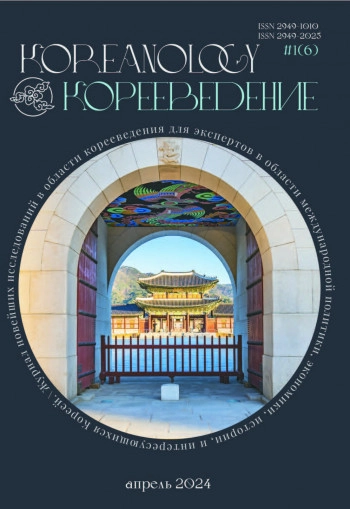1. Мерзлякова И.В. Социальная культура как основа социального благополучия человека и общества // Ученые записки Забайкальского государственного университета. Серия: Социологические науки, 2009. № 4. С. 97—100.
2. Министерство здравоохранения Республики Корея. Официальный сайт. URL: www.mohw.go.kr/react/index.jspndex.jsp (дата обращения: 19.04.23).
3. Скворцов И.П. Социальная политика в контексте социальной культуры: к определению понятия / И.П. Скворцов // Власть, 2012. № 1. С. 91—94.
4. [Особенности изменений в структуре корейских семей и последствия для политики: изменения после валютного кризиса 1997 года] // [Корейский центр исследований социального обеспечения], 2020. 427 с. (На кор.) , 2021. [Отношение к необходимости завести ребёнка, 2021] // KOSIS. URL: kosis.kr (дата обращения: 11.04.2023). (На кор.) [Политические обзоры Республики Корея]. Официальный сайт. URL: https://www.korea.kr/main.do (дата обращения: 19.04.23).
5. Anderson T., Kohler H. Education Fever and East Asian Fertility Puzzle. A Case Study of Low
Fertility in South Korea // Taylor & Francis Online. URL: https://www.tandfonline.com (дата обращения: 11.04.23).
6. Average annual wage in South Korea adjusted for Purchasing Power Parity from 2000 to 2021 // STATISTA. URL: https://www.statista.com/statistics/557759/south-korea-average-annual-wage/ (дата обращения: 20.04.23).
7. Average monthly expenditure on private education per student in South Korea in 2022, by
household income // STATISTA. URL: https://www.statista.com/statistics/642524/south-korea-spen ding-for-private-education-by-household-income/ (дата обращения: 07.04.23).
8. Chang H. Modernization and changing family structure in Korea: diss. — Sheffield: 1993. 330 p.
Childcare statistics, 2020 // Statistics Korea. URL: https://www.index.go.kr/potal/main/
EachDtlPageDetail.do?idx_cd=1583. (дата обращения: 10.04.23).
9. Chun J. J. et al. The struggles of irregularly�employed workers in South Korea, 1999—2012 //
UCLA Institute for Research on Labor and Employment, 2013. 22 p.
10. Davis K. The world demographic transition // The Annals of the American Academy of Political and Social Science, 1945. Т. 237. № . 1. P. 1—11.
11. ECEC Statistics of Korea: Services, Enrollment, Workforce, and Financial Resources. // KICCE
Policy Brief. No. 22, 2021. 6 p.
12. Joo J. S. et al. Korean longitudinal survey of women and families: The 2013 annual report // Seoul: Korean Women’s Development Institute, 2013.
13. KICCE: Korea Institute of Child Care and Education. Official Site. URL: https://kicce.re.kr/eng/
index.do (дата обращения: 07.04.23).
14. KICCE Spending Survey: A Study of Childrearing Costs and Demand for Childcare Services (?) // Korea Institute of Child Care and Education. URL: https://kicce.re.kr/eng/board/view.do?menu_
idx=15&manage_idx=138&board_idx=44474 (дата обращения: 07.04.2023).
15. Kim B. et al. Marriage, Independence and Adulthood among Unmarried Women in South Korea // Asian Journal of Social Science, 2016. 351 p.
16. Kim E. et al. Determinants of Perceived Accessibility of Maternity Leave and Childcare Leave in
South Korea // National Library of Medicine. URL: https://www.ncbi.nlm.nih.gov/pmc/articles/
PMC8507878/#B32-ijerph-18-10286 (дата обращения: 10.04.23).
17. Kim H., Shin E. Korea country note // International Review of Leave Policies and Research 2021. URL: https://www.leavenetwork.org/annual-review-reports/ (дата обращения: 10.04.23).
18. Kim S., Finch J. Living with Rhetoric, Living against Rhetoric: Korean Families and the IMF
Economic Crisis // Korean Studies, 2002. № 1 (26). P. 120—139.
19. Kim Y. M. Re�examination of the exclusion from social insurance coverage of non�standard
employment in Korea. Soc. Welf // Policy, 2010. Т. 37. P. 155—179.
20. Lee J. W. et al. Survey on the current status of nationwide childcare in 2018 // Ministry of Health and Welfare, 2018.
21. Lee Y. Norms about childcare, working hours, and fathers’ uptake of parental leave in South Korea // Community, Work&Family, 2022. P. 1—26.






